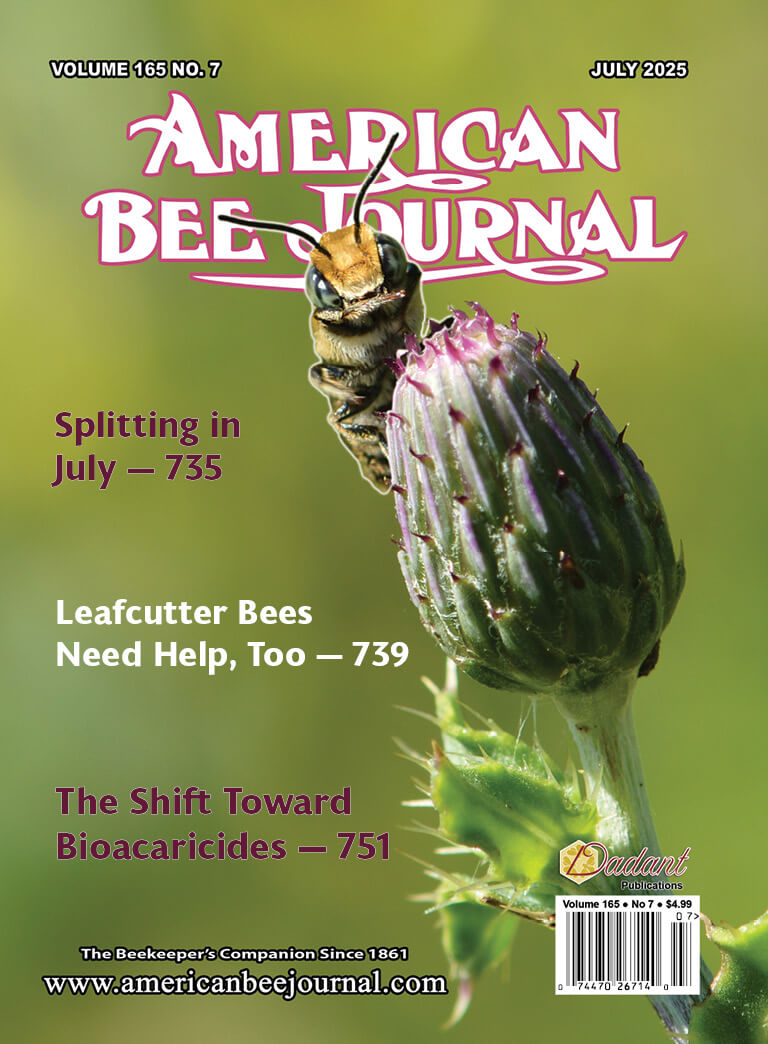This column must include some comments about our 2-queen hive experiment and we shall get that out of the way first this month. It is now official; we have one full depth hive body in the middle of the East and West colonies that is full of honey. We made one shallow super of comb honey. That makes this experiment somewhat successful, but hardly economically viable. I left the center hive body for the bees.
There are several single colonies in the apiary that made an equivalent amount of honey. That would be 3 shallow supers full of comb honey for sale. This beekeeping operation runs on comb honey sales and profits from those sales. A couple of single hives made 4 complete comb honey supers. That would be 25% more than our 2-queen experimental colony.
I do not intend to give up on the 2-queen colony system. However, my design has some definite short comings. At this point, the East colony is weak compared to the West colony. The two colonies need to be combined into a single colony for winter. I hope to get at least two nucleus colonies from the experiment in the spring. There are two other single colonies in the apiary that did not produce a marketable super. These colonies were also weak. One was started from a package, the other from a nucleus that started off well enough, but lost steam after a swarm.
It has always amazed me how optimistic we are. Beekeepers, ranchers and farmers all have that characteristic in common. No matter how bad the current season, they are optimistic about next season. We survive low prices or survive low productivity. When crops are sparse, the price rises. When the crop is abundant, prices drop. Economically, that is the law of supply and demand. It is an inevitable fact of life for every living thing including us and our bees.
Many animals will eat honey given a chance. Think for a moment about yourself. Imagine a plate full of homemade biscuits hot out of the oven. The ones grandma used to make. There is fresh butter and a whole pound of comb honey to go with those biscuits. You have not eaten since breakfast yesterday so you are very hungry. That first biscuit dripping with honey butter is the best thing you have eaten in a long while. It is so good you gobble another; after all, you are very hungry. You can have all you want so those little honey biscuits just keep going down. When you choke down the 10th one, your desire to eat anything has been completely buried in biscuits and honey butter.
Your personal market for biscuits and honey butter has been saturated. There is no longer any demand for biscuits, honey or butter in your life. At this time you would not give a nickel for another biscuit, a teaspoon of honey or butter. If someone wanted to sell you another biscuit with honey and butter, the price would need to be so cheap that you would take a chance on buying it to save for later, even though it would not be as appetizing as those biscuits straight from the oven. When demand is low, price drops. When you were hungry, demand was high. You would gladly have given a dollar or more for one biscuit with honey butter. Now you would not give a dime for one.
Bees operate on the same principle of supply and demand. Once the 2-queen colony filled the center of the 2-queen hive with comb honey, the need to store more honey became less urgent. Bees will continue to stock honey even overstock if space will allow, but they will slow down once enough has been stored for winter. If you reside where bees normally fill 2 – 3 supers of honey each season, you can put 5 or 6 on the colonies, but you already know they will not fill out more than 3 or 4. Dr. Milton Friedman’s book on economics will explain the entire law of supply and demand better than I can.
This past month I answered a couple of inquiries about honey storage. Specifically, they wanted to know about storing honey in the freezer. The best storage for any honey is in the freezer. A jar of honey stored in the freezer will not darken. The color of light honey will stay light for years in a …


